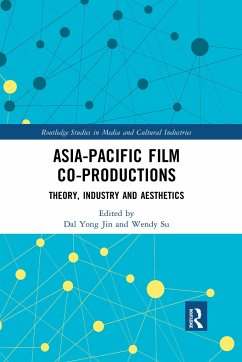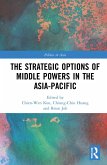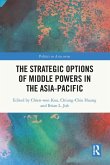Asia-Pacific Film Co-productions
Theory, Industry and Aesthetics
Herausgegeben:Jin, Dal Yong; Su, Wendy
Asia-Pacific Film Co-productions
Theory, Industry and Aesthetics
Herausgegeben:Jin, Dal Yong; Su, Wendy
- Broschiertes Buch
- Merkliste
- Auf die Merkliste
- Bewerten Bewerten
- Teilen
- Produkt teilen
- Produkterinnerung
- Produkterinnerung
This book examines cross-regional film collaboration within the Asia-Pacific region. Through a mixed methods approach of political economy, industry and market, as well as textual analysis, the book contributes to the understanding of the global fusion of cultural products and the reconfiguration of geographic, political, economic, and cultural relations. Issues covered include cultural globalization and Asian regionalization; identity, regionalism, and industry practices; and inter-Asian and transpacific co-production practices among the U.S.A., China, South Korea, Japan, India, Hong Kong, Taiwan, Argentina, Australia, and New Zealand. …mehr
Andere Kunden interessierten sich auch für
![The Changing Face of Korean Cinema The Changing Face of Korean Cinema]() Brian YeciesThe Changing Face of Korean Cinema49,99 €
Brian YeciesThe Changing Face of Korean Cinema49,99 €![Korean Film and Festivals Korean Film and Festivals]() Korean Film and Festivals42,99 €
Korean Film and Festivals42,99 €![Introducing Korean Popular Culture Introducing Korean Popular Culture]() Introducing Korean Popular Culture39,99 €
Introducing Korean Popular Culture39,99 €![Introducing Korean Popular Culture Introducing Korean Popular Culture]() Introducing Korean Popular Culture154,99 €
Introducing Korean Popular Culture154,99 €![The Strategic Options of Middle Powers in the Asia-Pacific The Strategic Options of Middle Powers in the Asia-Pacific]() The Strategic Options of Middle Powers in the Asia-Pacific142,99 €
The Strategic Options of Middle Powers in the Asia-Pacific142,99 €![The Strategic Options of Middle Powers in the Asia-Pacific The Strategic Options of Middle Powers in the Asia-Pacific]() The Strategic Options of Middle Powers in the Asia-Pacific45,99 €
The Strategic Options of Middle Powers in the Asia-Pacific45,99 €![Healing Historical Trauma in South Korean Film and Literature Healing Historical Trauma in South Korean Film and Literature]() Chungmoo ChoiHealing Historical Trauma in South Korean Film and Literature44,99 €
Chungmoo ChoiHealing Historical Trauma in South Korean Film and Literature44,99 €-
-
-
This book examines cross-regional film collaboration within the Asia-Pacific region. Through a mixed methods approach of political economy, industry and market, as well as textual analysis, the book contributes to the understanding of the global fusion of cultural products and the reconfiguration of geographic, political, economic, and cultural relations. Issues covered include cultural globalization and Asian regionalization; identity, regionalism, and industry practices; and inter-Asian and transpacific co-production practices among the U.S.A., China, South Korea, Japan, India, Hong Kong, Taiwan, Argentina, Australia, and New Zealand.
Produktdetails
- Produktdetails
- Routledge Studies in Media and Cultural Industries
- Verlag: Routledge / Taylor & Francis
- Seitenzahl: 340
- Erscheinungstermin: 30. September 2021
- Englisch
- Abmessung: 229mm x 152mm x 18mm
- Gewicht: 471g
- ISBN-13: 9781032176475
- ISBN-10: 1032176474
- Artikelnr.: 62571306
- Herstellerkennzeichnung
- Libri GmbH
- Europaallee 1
- 36244 Bad Hersfeld
- gpsr@libri.de
- Routledge Studies in Media and Cultural Industries
- Verlag: Routledge / Taylor & Francis
- Seitenzahl: 340
- Erscheinungstermin: 30. September 2021
- Englisch
- Abmessung: 229mm x 152mm x 18mm
- Gewicht: 471g
- ISBN-13: 9781032176475
- ISBN-10: 1032176474
- Artikelnr.: 62571306
- Herstellerkennzeichnung
- Libri GmbH
- Europaallee 1
- 36244 Bad Hersfeld
- gpsr@libri.de
Dal Yong Jin finished his PhD at the Institute of Communications Research at the University of Illinois, Urbana-Champaign, in 2005. He has taught in three countries: the U.S.A., Canada, and Korea. His major research and teaching interests are globalization and media, Korean cinema, Asian media studies, transnational cultural studies, new media and digital gaming, and the political economy of media and culture. He is the author of several books, including Smartland Korea: Mobile Communication, Culture and Society (University of Michigan Press, 2017); New Korean Wave: Transnational Cultural Power in the Age of Social Media (University of Illinois Press, 2016); Digital Platforms, Imperialism and Political Culture (Routledge, 2015); De-convergence of Global Media Industries (Routledge, 2013); and Korea's Online Gaming Empire (MIT Press, 2010). He has also edited several volumes, including Mobile Gaming in Asia: Politics, Culture and Emerging Technologies (Springer, 2016); The Political Economies of Media: The Transformation of the Global Media Industries (Bloomsbury, 2011); and Global Media Convergence and Cultural Transformation: Emerging Social Patterns and Characteristics (IGI Global, 2011). In addition, he has contributed numerous journal articles and book chapters. Wendy Su is an Associate Professor of the Department of Media and Cultural Studies at University of California, Riverside. She is the author of China's Encounter with Global Hollywood: Cultural Policy and the Film Industry, 1994-2013 (University Press of Kentucky, 2016). She has also published in a number of high-ranking academic journals, including Pacific Affairs, International Journal of Cultural Policy, Critical Studies in Media Communication, Global Media and Communication, Journal of International Communication, and Asian Journal of Communication. She was a winner of the 2014 William L. Holland Prize for the best article, granted by Pacific Affairs. Her research areas are global communication, Chinese media studies and cultural studies, transnational film studies, audience research, and Asian modernity.
Table of Contents Asia-Pacific Film Coproduction: Introduction Dal Yong Jin and Wendy Su Part I: Regionalization, Globalization, and Co-productions Chapter 1. Cultural Globalization through Film Co-productions in the Asia-Pacific Region Dal Yong Jin Chapter 2. Fast Boats from Hollywood to China-vice versa-or Ships Passing in the Night? The PRC Meets the NICL Toby Miller Chapter 3. Sleeping with the Intimate 'Enemy'? Dynamics and Precarities of Chinese co-productions in the case of the 'Korea Ban' Lisa LEUNG Yuk-ming Part II: Industry, Collaboration, and Asian Regionalization Chapter 4. Post-2014 Chinese-Korean Film Co-production: Nation Branding via Online Film Publicity Elaine Chung Chapter 5. Hindi Chini Bhai Bhai: Examining India-China co-production deals in Globalized Media Markets Ruhi Khan Chapter 6. International film co-productions as a new harbour of nationalistic communication amid regional 'imagined communities': The case of China and Korea Mi-Sook Park Chapter 7. Is the China Party Over?: Global Integration, State Intervention, and Changing China-Hollywood Relations: 2014-2018 Wendy Su Chapter 8. Transnational film project in the changing media ecology: The case of Okja Dong-Hoo Lee Part III. Cultural Flows, Cultural Globalization, and The Asia-Pacific Chapter 9. Influential Factors for Producing Film co-productions between Korea and New Zealand Kim JuHee Chapter 10. Co-producing with the Other Side of the World: Argentine-Korean Films and International Film Festivals Lucía Rud Chapter 11. Connecting with China, Hollywood and Film Festivals: The Collaboration and Co-production of Taiwanese Filmmakers in the Era of Neo-liberal Globalization Jocelyn Yi-Hsuan Lai Part IV: Aesthetics in Co-productions Chapter 12. Beyond Japan-Taiwan Coproduction: Intertextuality and Elliptical Figures in Hou Hsiao-hsien's Café Lumière Michelle Bloom and Satoko Kakihara Chapter 13. Seoul-Hong Kong-Macau: Love with an Alien (1957) and Postwar Korea-Hong Kong Coproduction Sangjoon Lee Chapter 14. Docu-reality and Empathy in Bloodless (2017): A Manifesto for Transnational Virtual Reality Cinema Luke Buckmaster and Brian Yecies Chapter 15. Final Recipe as a Pan-Asian Co-production Film: Interview with Director Gina Kim Dal Yong Jin
Table of Contents Asia-Pacific Film Coproduction: Introduction Dal Yong Jin and Wendy Su Part I: Regionalization, Globalization, and Co-productions Chapter 1. Cultural Globalization through Film Co-productions in the Asia-Pacific Region Dal Yong Jin Chapter 2. Fast Boats from Hollywood to China-vice versa-or Ships Passing in the Night? The PRC Meets the NICL Toby Miller Chapter 3. Sleeping with the Intimate 'Enemy'? Dynamics and Precarities of Chinese co-productions in the case of the 'Korea Ban' Lisa LEUNG Yuk-ming Part II: Industry, Collaboration, and Asian Regionalization Chapter 4. Post-2014 Chinese-Korean Film Co-production: Nation Branding via Online Film Publicity Elaine Chung Chapter 5. Hindi Chini Bhai Bhai: Examining India-China co-production deals in Globalized Media Markets Ruhi Khan Chapter 6. International film co-productions as a new harbour of nationalistic communication amid regional 'imagined communities': The case of China and Korea Mi-Sook Park Chapter 7. Is the China Party Over?: Global Integration, State Intervention, and Changing China-Hollywood Relations: 2014-2018 Wendy Su Chapter 8. Transnational film project in the changing media ecology: The case of Okja Dong-Hoo Lee Part III. Cultural Flows, Cultural Globalization, and The Asia-Pacific Chapter 9. Influential Factors for Producing Film co-productions between Korea and New Zealand Kim JuHee Chapter 10. Co-producing with the Other Side of the World: Argentine-Korean Films and International Film Festivals Lucía Rud Chapter 11. Connecting with China, Hollywood and Film Festivals: The Collaboration and Co-production of Taiwanese Filmmakers in the Era of Neo-liberal Globalization Jocelyn Yi-Hsuan Lai Part IV: Aesthetics in Co-productions Chapter 12. Beyond Japan-Taiwan Coproduction: Intertextuality and Elliptical Figures in Hou Hsiao-hsien's Café Lumière Michelle Bloom and Satoko Kakihara Chapter 13. Seoul-Hong Kong-Macau: Love with an Alien (1957) and Postwar Korea-Hong Kong Coproduction Sangjoon Lee Chapter 14. Docu-reality and Empathy in Bloodless (2017): A Manifesto for Transnational Virtual Reality Cinema Luke Buckmaster and Brian Yecies Chapter 15. Final Recipe as a Pan-Asian Co-production Film: Interview with Director Gina Kim Dal Yong Jin








